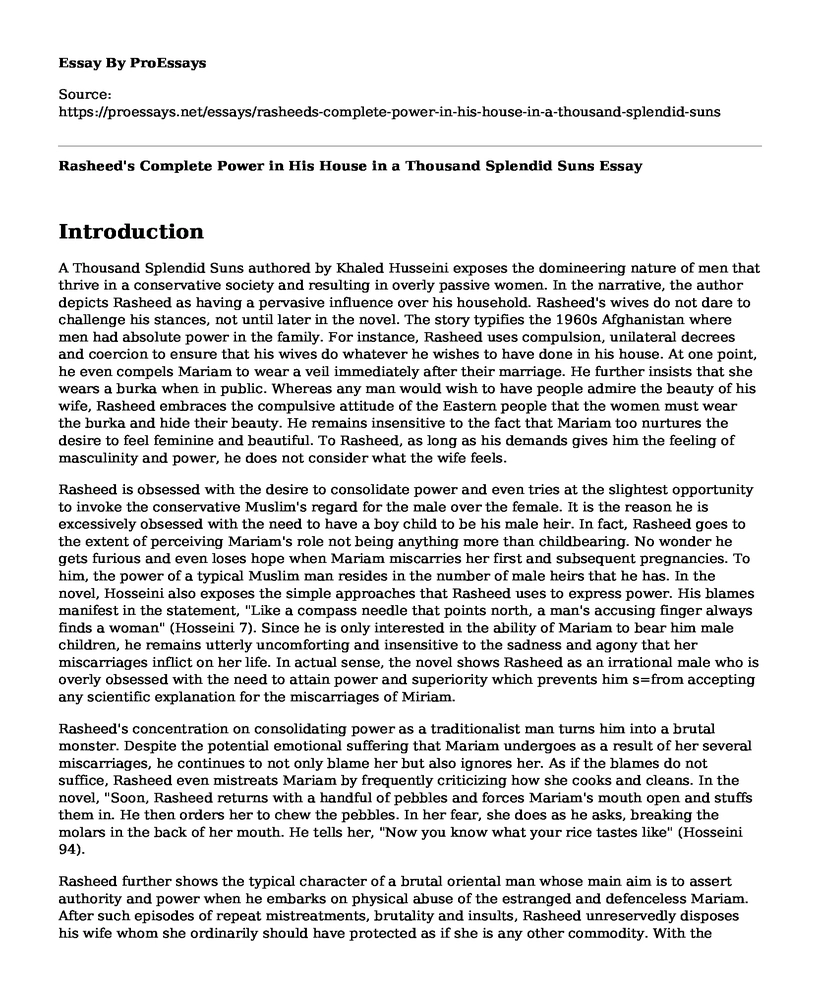Introduction
A Thousand Splendid Suns authored by Khaled Husseini exposes the domineering nature of men that thrive in a conservative society and resulting in overly passive women. In the narrative, the author depicts Rasheed as having a pervasive influence over his household. Rasheed's wives do not dare to challenge his stances, not until later in the novel. The story typifies the 1960s Afghanistan where men had absolute power in the family. For instance, Rasheed uses compulsion, unilateral decrees and coercion to ensure that his wives do whatever he wishes to have done in his house. At one point, he even compels Mariam to wear a veil immediately after their marriage. He further insists that she wears a burka when in public. Whereas any man would wish to have people admire the beauty of his wife, Rasheed embraces the compulsive attitude of the Eastern people that the women must wear the burka and hide their beauty. He remains insensitive to the fact that Mariam too nurtures the desire to feel feminine and beautiful. To Rasheed, as long as his demands gives him the feeling of masculinity and power, he does not consider what the wife feels.
Rasheed is obsessed with the desire to consolidate power and even tries at the slightest opportunity to invoke the conservative Muslim's regard for the male over the female. It is the reason he is excessively obsessed with the need to have a boy child to be his male heir. In fact, Rasheed goes to the extent of perceiving Mariam's role not being anything more than childbearing. No wonder he gets furious and even loses hope when Mariam miscarries her first and subsequent pregnancies. To him, the power of a typical Muslim man resides in the number of male heirs that he has. In the novel, Hosseini also exposes the simple approaches that Rasheed uses to express power. His blames manifest in the statement, "Like a compass needle that points north, a man's accusing finger always finds a woman" (Hosseini 7). Since he is only interested in the ability of Mariam to bear him male children, he remains utterly uncomforting and insensitive to the sadness and agony that her miscarriages inflict on her life. In actual sense, the novel shows Rasheed as an irrational male who is overly obsessed with the need to attain power and superiority which prevents him s=from accepting any scientific explanation for the miscarriages of Miriam.
Rasheed's concentration on consolidating power as a traditionalist man turns him into a brutal monster. Despite the potential emotional suffering that Mariam undergoes as a result of her several miscarriages, he continues to not only blame her but also ignores her. As if the blames do not suffice, Rasheed even mistreats Mariam by frequently criticizing how she cooks and cleans. In the novel, "Soon, Rasheed returns with a handful of pebbles and forces Mariam's mouth open and stuffs them in. He then orders her to chew the pebbles. In her fear, she does as he asks, breaking the molars in the back of her mouth. He tells her, "Now you know what your rice tastes like" (Hosseini 94).
Rasheed further shows the typical character of a brutal oriental man whose main aim is to assert authority and power when he embarks on physical abuse of the estranged and defenceless Mariam. After such episodes of repeat mistreatments, brutality and insults, Rasheed unreservedly disposes his wife whom she ordinarily should have protected as if she is any other commodity. With the thought that he should remain powerful, Rasheed neglects the human and sublime feelings of love and affection to dispose of his wife when he feels that she is barren.
Conclusion
Rasheed feeling of being powerful makes him not only egoistic but also uncaring to the extent that he is only concerned with continuity of his ancestral line even if that means mistreating his wife and attributing misogynist references towards her character and personality. He has a retrogressive perception of women as mere commodities that a man can use and discard whenever they feel that they have become less useful. Rasheed believes that the only way to show the society that he has power is by having male children. This is why he goes an extra mile to marry a second wife called Leila which makes him a polygamist just in the hope that she will bear him a son to salvage his reputation. He uses abandonment to detach himself from Mariam whom he perceives as having become less useful for failing to bear him a child. His desire to consolidate male power makes him exclusively preoccupied with having a woman who can bear him a male heir. No wonder, out of sheer hope and enjoyment that Leila will bear him a male son refers to her as "you...are a Benz. A brand-new, first-class shiny Benz" (Hosseini 216).
Work Cited
Hosseini, Khaled. A Thousand Splendid Suns. London: Bloomsbury, 2008. Print.
Cite this page
Rasheed's Complete Power in His House in a Thousand Splendid Suns. (2022, Apr 28). Retrieved from https://proessays.net/essays/rasheeds-complete-power-in-his-house-in-a-thousand-splendid-suns
If you are the original author of this essay and no longer wish to have it published on the ProEssays website, please click below to request its removal:
- Literary Analysis Essay on Gain and Loss in 'Paradise Lost' by John Milton
- Critical Essay on The Tempest: Scene 4
- Annotated Bibliography: Metamorphosis by Franz Kafka
- Literary Analysis Essay on "Let America be America again"
- Understanding Ralph Ellison's Invisible Man Paper Example
- Essay Sample on Hamlet's Revenge: War, Murder, and Family in Denmark
- The Relevance of the Tempest in the Modern World Essay Example







